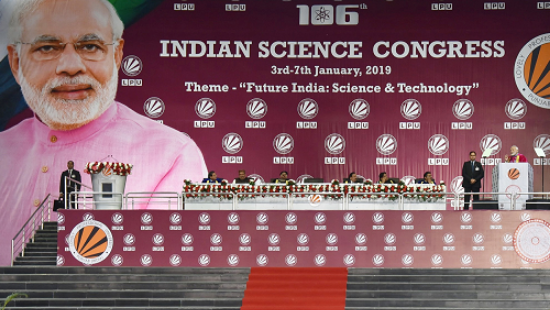cientists and science academicians decry efforts to pass off mythology as science at the just concluded Indian Science Congress. In a joint letter to Indian Science Congress, they said, such unscientific claims tarnish the image of Indian science globally
Mumbai (ISJ) – Thirty seven scientists and science academicians have decried efforts to pass off mythology as science at the just concluded Indian Science Congress held at Jalandhar. In a joint letter addressed to the General President of Indian Science Congress Association internationally acclaimed Astrophysicist Dr Jayant V Narlikar, Professor Dipankar Chatterjee and Professor S. Mahadevan of Indian Institute of Science, Bangalore, Professor Naba Kumar Mondal of Saha Institute of Nuclear Physics, Kolkata, Professor R. Ramanujam of Institute of Mathematical Sciences, Chennai, Dr M.C. Arunan of Homi Bhabha Centre for Science Education, Mumbai said, such claims tarnish the image of Indian science and scientific community.
“Such content in the ISC undermines the long scientific tradition of the ISC, which, in the past, has been led by outstanding scientists such as Acharya Prafulla Chandra Ray, Sir Nam Nath Chopra and Prof. P. Parja,” said the scientists in their joint letter. “Such claims tarnish the image of Indian science globally and also undermine the credibility of the genuine contribution of the great science personalities of yore that too, in front of young and impressionable minds.”
They expressed concern at such recurring happenings at the annual conclave of scientists from India and abroad. The scientists demanded stronger steps to ensure that the ISCA actually promotes and advances the cause of science.
The controversy arose after Andhra Pradesh University Vice Chancellor G. Nageswara Rao claimed India had the knowledge of stem cell research, test tube fertilisation and guided missiles thousands of years ago.
Dr Rao claimed Kauravas were born out of stem cell and Lord Vishnu had possessed heat missile technology.
“Hundred fertilised eggs were put in 100 earthen pots. Is it not test-tube babies…? Stem cell research was done in this country, thousands of years ago. Thousands of years ago, we had this technology, we had 100 Kaurvas from one mother because of stem-cell technology,” Dr Rao told students while addressing the Children Science Congress, a part of the Indian Science Congress.
Another speaker at the Children Science Congress, Kannan Jegathala Krishnan rejected Einstein’s theory of relativity, Newton’s theory of gravity and Hawking’s theories on black holes.
Principal Scientific Advisor to the Government Professor K. Vijaya Raghavan also described efforts to push pseudoscience at such conclaves as “unfortunate”.
The organisers of the conclave, Indian Science Congress Association have however distanced itself from the controversy and “condemned” the comments of Dr Rao. Its General Secretary Premendu P. Mathur told media that ISC has changed the policy now and speakers have to submit an abstract and secondly they have to give an undertaking that they will not deviate from the subject.
Dr Arunan, one of the signatories of the memorandum, told Indian Science Journal that not many frontline scientists attend Indian Science Congress now.
“Earlier ISC used to be populated by stalwarts of Indian Science. Scientists are as much to be blamed as the usurpers,” he quipped.
Indian Science Congress sessions have been mired in controversies in the recent times.
At the 105th Indian Science Congress in Imphal, Science & Technology Minister Dr Harsh Vardhan had claimed, Stephen Hawking had said, the Vedas have a theory that is superior to Albert Einstein’s famous equation E=mc^2.
Prime Minister Narendra Modi himself had claimed India had mastered genetic sciences during the Mahabharata period. Inaugurating a hospital in Mumbai in 2014, he had said, “Mahabharata says Karna was not born from his mother’s womb. This means that genetic science was present at that time. That is why Karna could be born outside his mother’s womb.”


